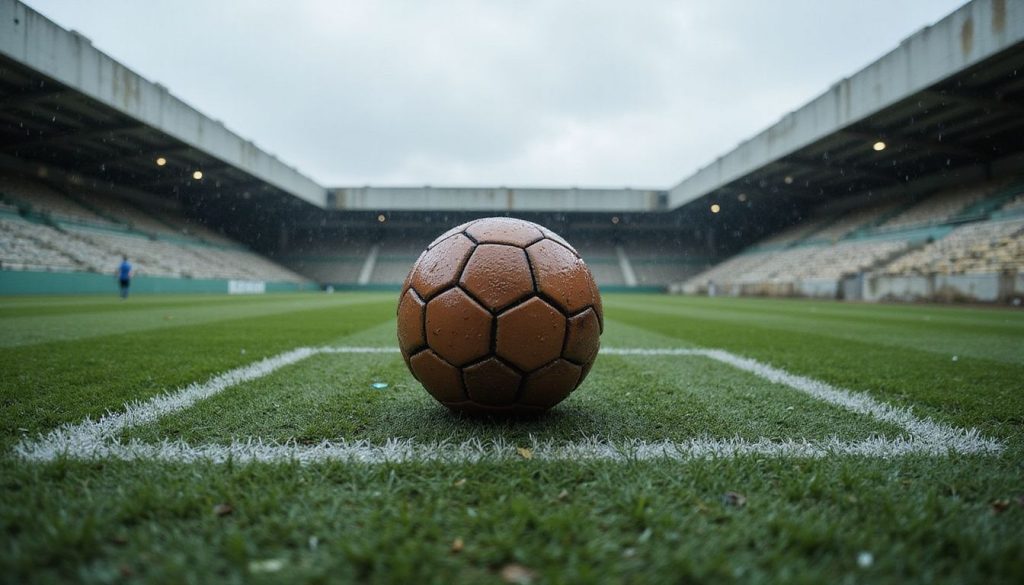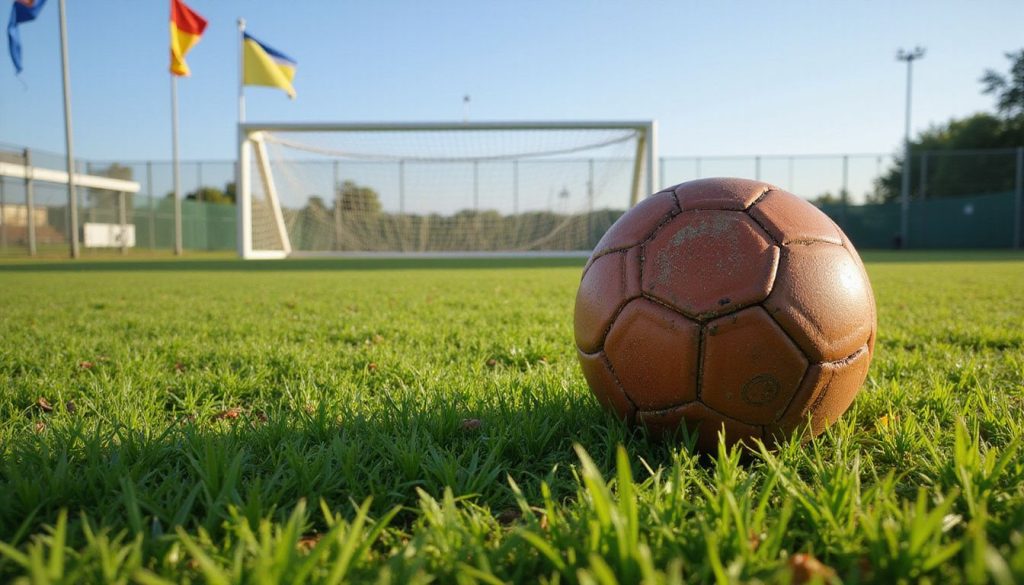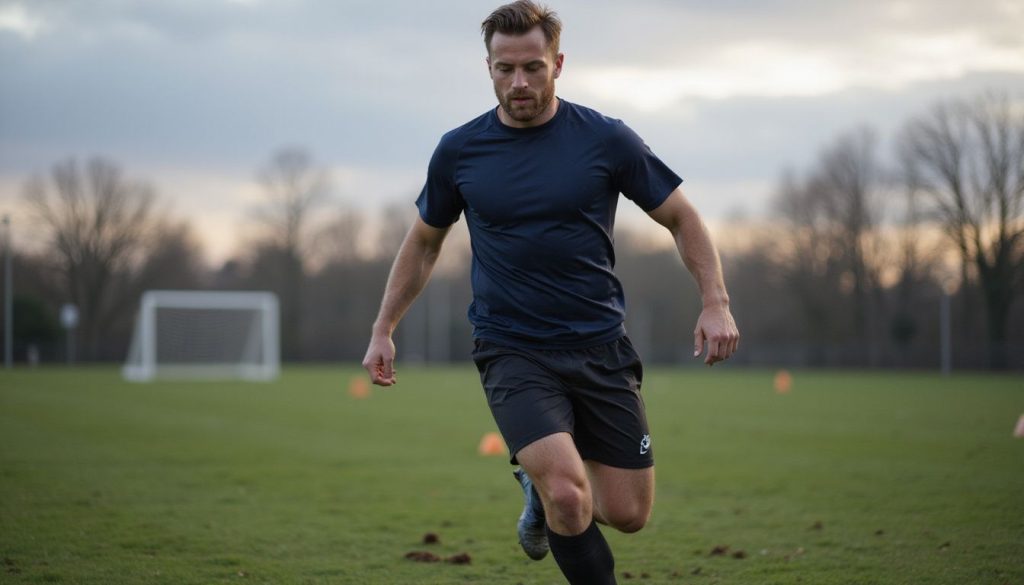Pre-Match Football Meal Plan
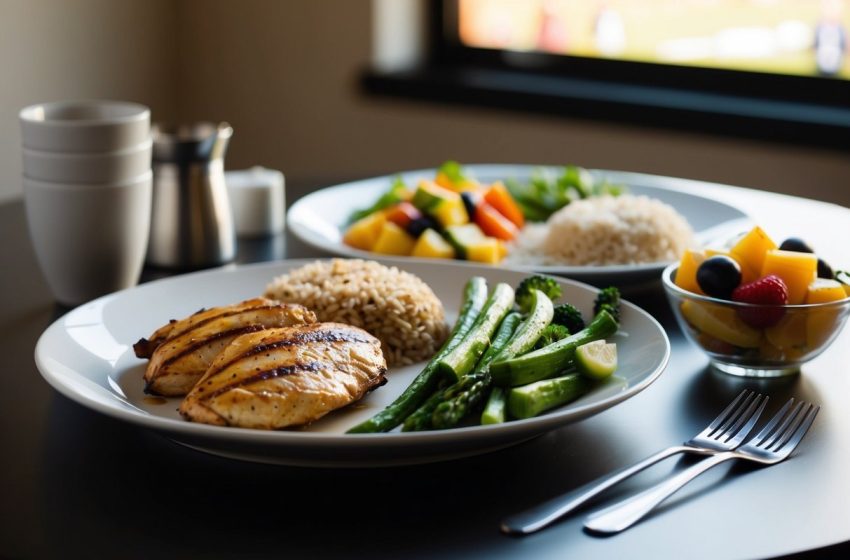
Pre-Match Football Meal Plan: What to Eat for Peak Game Day Performance
Getting your pre-match meal right can make a real difference in how you play on the field. It’s easy to overlook, but what you eat and when you eat it matters for your energy, focus, and performance.

A balanced pre-match meal made up of complex carbohydrates, lean protein, and healthy fats gives you steady fuel and helps you feel your best when it’s game time. Eating your main meal about 2 to 4 hours before kick-off gives your body time to digest, so you won’t feel heavy or sluggish while playing.
If you’re looking to improve your match day routine or simply want to know what fuels top athletes, a smart meal plan before your next football game can give you an edge.
The Importance of a Pre-Match Football Meal Plan

A well-planned pre-match meal can make a big difference in your energy levels, focus, and physical ability during a football game. The right foods and drinks help your body perform at its best and prevent drops in endurance or speed.
Boosting Energy and Focus
Eating the right meal before a match gives your body the fuel it needs to play at a high level. Carbohydrates, such as whole grain bread, rice, or pasta, are the main source of energy for your muscles. Your body turns these foods into glucose, which powers you during quick sprints and intense plays.
Proteins and a small amount of healthy fats also help keep you feeling full and focused without weighing you down. Foods like grilled chicken, eggs, and yogurt offer protein to support your muscles.
A balanced pre-match meal helps your brain stay alert. When your energy is steady, it’s easier to think clearly and react quickly on the field.
Sample Foods for Energy and Focus:
- Oatmeal with banana
- Turkey sandwich on whole grain bread
- Grilled chicken and rice
- Low-fat yogurt with fruit
Preventing Dehydration and Fatigue
Hydration is as important as food before your match. Even a small amount of dehydration can lower your speed and make you feel tired faster.
You should drink water with your pre-game meal, aiming for at least 20 ounces about 3-4 hours before kickoff. This helps your muscles stay hydrated and keeps your body temperature in check during the game.
Include foods with a high water content, such as oranges or cucumbers, to boost your fluid intake. Avoid sugary drinks and sodas, as they can dehydrate you.
Quick Tips for Staying Hydrated:
- Drink water regularly the day before and on match day
- Eat fruits and vegetables with high water content
- Avoid caffeine right before the game
Enhancing Endurance, Agility, and Speed
Endurance, agility, and speed rely on the nutrients you eat before you play. A meal high in complex carbohydrates builds up your muscle glycogen stores. This stored energy helps you run longer and move quickly throughout the match.
Lean proteins support muscle repair, which is important for staying agile and quick on your feet. Healthy fats, such as those found in avocados or olive oil, give your body a steady energy source for longer periods.
Consistent pre-match nutrition lets you keep up with the fast pace of football and reduces the risk of injury from tired muscles.
Nutrients That Help with Peak Performance:
| Nutrient | Example Sources | How It Helps |
|---|---|---|
| Carbs | Rice, pasta, potatoes | Sustains endurance |
| Protein | Eggs, chicken, tofu | Supports muscle strength |
| Healthy Fat | Avocado, olive oil | Fuels long-term energy |
Key Nutritional Components for Football Players

Eating the right kinds of food helps you perform your best on the field. Your meal plan should give you the energy, strength, and nutrients needed to compete and recover.
Carbohydrates for Sustained Energy
Carbohydrates are your main source of fuel during football matches. You should include foods like rice, whole wheat pasta, potatoes, and fruit in your pre-match meals.
Aim for at least 70 grams of carbohydrates in your main pre-game meal and about 30 grams in your snack. These foods will help keep your energy levels steady throughout the game.
Choose lower fiber carbohydrates before the match, such as white rice or toast, to avoid stomach discomfort. Carbs digest faster and provide quick energy, which is important for sprinting and moving quickly on the field.
Example foods:
- White bread and honey
- Mashed potatoes
- Bananas
If you aren’t sure how much to eat, a sports nutritionist can help put together a plan for your body, weight, and position.
Lean Protein for Strength and Recovery
Protein helps your muscles repair and grow after hard practice and games. Include a moderate amount of lean protein in your pre-match meal.
Good options are grilled chicken, turkey, eggs, or fish. Try to avoid fatty cuts of meat because they slow down digestion. About 20-30 grams of protein is a good target to support your muscles.
Protein also helps you feel satisfied, so you won’t be hungry during the match. Try putting a few slices of lean chicken or some scrambled eggs on your plate.
Quick protein picks:
- Grilled fish
- Boiled eggs
- Skinless chicken breast
A balanced mix of protein and carbs can give you both energy and support for your muscles.
Healthy Fats for Balanced Meals
Fats give you energy over a longer period and help your body absorb certain vitamins. It’s best to choose healthy fats before a match and eat them in small amounts.
Good choices are avocado, olive oil, nuts, and seeds. Avoid fried or greasy foods because they can make you feel heavy or upset your stomach.
A tablespoon of peanut butter or a handful of almonds can go with your meal or snack. These fats make your meal more complete and keep your energy going during play.
Healthy fats to add:
- Sliced avocado
- Drizzle of olive oil
- Unsalted nuts
Stick to simple, natural sources of fat for best results.
Essential Vitamins and Minerals
Vitamins and minerals help your body work well by supporting your muscles, nerves, and hydration. Eat a variety of fruits and vegetables to get important nutrients like vitamin C, potassium, and magnesium.
Lower fiber fruits, like melons or grapes, are great before a match. These foods also help you stay hydrated and cut down on cramps.
Don’t forget to drink water—aim for 16 ounces two to three hours before you play. Sports drinks can also help replace lost electrolytes in hot weather or long games.
Key nutrients to include:
- Vitamin C (oranges, strawberries)
- Potassium (bananas, potatoes)
- Magnesium (spinach, seeds)
Talk to a sports nutritionist if you have questions about getting enough vitamins and minerals from your meals.
Building a Balanced Pre-Match Football Meal
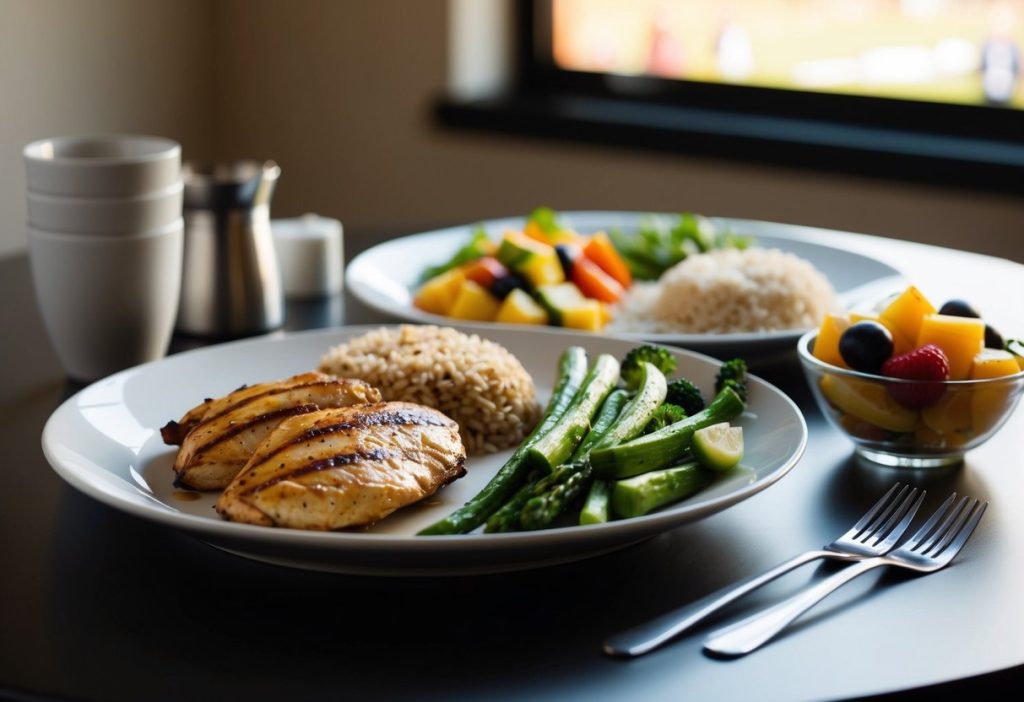
A healthy pre-match meal gives your body lasting energy and the right nutrients for football. Choosing the best foods helps you stay focused, play harder, and recover faster after the game.
Incorporating Whole Grains and Vegetables
Base your meal on whole grains and a mix of vegetables. Whole-wheat pasta, brown rice, or quinoa are rich in complex carbohydrates, which provide steady energy for the match. Try using a bowl of oatmeal or a slice of whole-grain bread if you want something lighter.
Pair these with plenty of vegetables. Leafy greens like spinach or kale, bright bell peppers, and baked sweet potatoes are all smart choices. A small salad topped with olive oil is easy to prepare and gentle on your stomach.
Use the following table as a guide:
| Whole Grains | Vegetables |
|---|---|
| Brown rice | Spinach, kale, lettuce |
| Whole-wheat pasta | Peppers, carrots |
| Quinoa | Broccoli, sweet potato |
| Oatmeal, bread | Tomatoes, cauliflower |
Aim for half of your plate to be filled with these foods.
Adding Lean Meats, Fish, and Plant-Based Proteins
Choose lean proteins to help your muscles recover and support energy for a full match. Go for grilled or baked chicken, turkey, or fish like salmon or tuna. Avoid fried or heavily seasoned meat, as these can upset your stomach.
Plant-based proteins are also great options. Beans, lentils, and chickpeas give you protein and extra fiber. Eggs are another simple source of protein, especially scrambled or hard-boiled.
Here are easy protein options:
- Grilled chicken or turkey breast
- Broiled fish (salmon, tuna, or cod)
- Cooked beans or legumes (chickpeas, lentils)
- Two hard-boiled eggs
Keep portions moderate—about the size of your palm—to avoid feeling too full before you play.
Integrating Fruits, Nuts, Seeds, and Dairy
Fruits add quick-digesting carbs and important vitamins. Bananas, apples, oranges, or berries are all easy to eat before a game. Pairing fruit with a serving of yogurt gives you calcium and probiotics for gut health.
Nuts and seeds offer healthy fats and a small amount of protein. Choose unsalted options like almonds, walnuts, or sunflower seeds. Sprinkle chia seeds or flaxseeds over your yogurt or oatmeal for extra fiber.
If you enjoy dairy, low-fat yogurt or a small piece of cheese are good choices. These foods help you feel satisfied without feeling weighed down. Stick to single servings:
- 1 cup yogurt with berries
- 1 apple with a handful of unsalted nuts
- 1 tablespoon seeds over oatmeal or salad
This combination helps support energy, hydration, and muscle function for your best performance.
Hydration Strategies Before Kickoff

Staying hydrated helps you start the match strong and can prevent fatigue and cramps. Drinking the right fluids at the right times supports focus and gives your body what it needs for peak football performance.
Optimal Water Intake
Start drinking water early in the day before your game. Aim to sip water throughout the morning and afternoon, not just right before kickoff. Try to drink about 5–7 milliliters of water per kilogram of body weight in the 2–4 hours leading up to the match.
For example, if you weigh 70 kg, this is around 350–490 milliliters. Don’t force yourself to drink large amounts all at once. Spacing out your water intake keeps you comfortable and avoids stomach upset.
If you’re already thirsty, you may be slightly dehydrated. Check your urine color—it should be light yellow, not dark. Keep a water bottle with you to remind yourself to sip regularly.
Role of Electrolytes and Sports Drinks
Water is important, but sometimes you need more, especially if it’s hot or you sweat a lot. Electrolytes (like sodium and potassium) help your body keep fluids balanced and muscles working right.
A sports drink can be helpful about 1–2 hours before the match, especially after a big sweat or if you haven’t eaten much salt. Look for drinks that have a mix of carbohydrates and electrolytes. These help keep your energy steady and replace what you lose in sweat.
Don’t overdo sports drinks; too much can lead to extra sugar or stomach troubles. Use them as a tool, especially for games in warm weather or intense conditions.
Avoiding Energy Drinks and Dehydration
Energy drinks are not a good choice for pre-match hydration. These drinks often have high caffeine and lots of sugar. They can lead to heart racing, jitters, and even dehydration.
Caffeine acts as a diuretic, which means you might lose water instead of keeping it. Sugar rushes can cause energy crashes during the game. Always read drink labels if you’re unsure.
Stick with water and, if needed, sports drinks that are made for athletes. Avoid drinks that advertise “energy” or have high caffeine content, especially before you play.
Meal Timing and Portion Control
Eating the right foods at the right times helps you feel energized and focused for your football match. Proper portion sizes can give you enough fuel without leaving you feeling too full or heavy before the game.
Optimal Timing for Pre-Match Meals
Aim to eat your main pre-match meal about three hours before kickoff. This gives your body time to digest the food and turn it into energy. If you eat too close to the game, you may feel sluggish or have a stomach ache.
Breakfast or lunch before a match should include a mix of carbohydrates, like rice, pasta, or potatoes, along with some vegetables and a small amount of protein (such as chicken or eggs). Avoid fatty or fried foods, which take longer to digest.
If you want a snack closer to kick-off, try something simple about one hour before the game. A banana, a piece of toast, or an energy bar are good choices for quick energy. Remember to drink water before and during the match to stay hydrated.
Recommended Portion Sizes
For your main pre-match meal, don’t eat until you are overly full. A helpful guideline is to make half your plate carbohydrates, one quarter protein, and one quarter vegetables. This keeps your energy steady without weighing you down.
Here’s a simple example meal:
| Food Group | Serving Example |
|---|---|
| Carbohydrate | 1-2 cups cooked pasta or rice |
| Protein | 3-4 ounces chicken or tofu |
| Vegetables | 1 cup steamed broccoli |
Listen to your body. If you feel too stuffed, try smaller servings next time, or add a light snack between meals. This approach helps you follow a balanced and healthy eating plan without guessing how much food is enough.
Smart Food Choices for Pre-Match Meals
Eating the right foods before your football match can help you play your best. Focusing on balanced meals and avoiding common mistakes with your food choices will keep your energy up and your stomach feeling good.
Best Pre-Game Meal Options
A good pre-match meal has a mix of carbohydrates, lean proteins, and healthy fats. Carbohydrates give you quick energy, while protein helps with muscle support. Some healthy foods you might eat are:
- Grilled chicken or turkey
- Pasta with a small amount of tomato sauce
- Brown rice or whole grain bread
- Steamed vegetables like peas or corn
- Fruit, such as bananas or blueberries
- Low-fat yogurt or oatmeal
Sample meal idea: Grilled chicken breast, a serving of pasta, a side of mixed veggies, and a piece of fruit.
Aim to eat this meal about 3–4 hours before your game. Drink water with your meal to stay hydrated, trying for at least 20 ounces before you play. Simple, fresh foods are the best food choices to keep you feeling your best on the field.
Foods to Limit or Avoid
Some foods can slow you down or upset your stomach during a game. It’s best to skip foods that are high in fat or hard to digest.
Try not to eat:
- Fried foods (like fries, fried chicken, or fast food)
- Fatty meats (like bacon, sausage, or ribeye steak)
- Creamy sauces (such as Alfredo, heavy cheese, or fettuccini)
- Sweets or pastries
- Soda or energy drinks
Eating these foods can lead to stomach cramps, low energy, or feeling heavy. Stick to lighter, simple ingredients as part of your pre-match meal plan. This way, you can focus on your performance and not on feeling sluggish or uncomfortable.
Addressing Special Dietary Needs and Preferences
Making your pre-match meal plan work for everyone can take a bit of planning. The right choices make sure you get enough energy and nutrients, even if your diet has special requirements or you need to avoid certain foods.
Vegetarian and Vegan Meal Plans
If you follow a vegetarian or vegan meal plan, protein and iron are two key things to think about. You can get protein from foods like beans, lentils, tofu, quinoa, and seeds. Including nuts or nut butters also helps boost your energy and protein levels.
Sample food ideas for pre-match meals:
- Chickpea salad sandwich on whole grain bread
- Brown rice bowl with tofu, veggies, and pumpkin seeds
- Pasta with tomato sauce, lentils, and spinach
Don’t forget about healthy fats. Avocado, olive oil, and seeds are good choices that help you feel full and give you lasting energy. Fortified plant milks or dairy, along with leafy greens and beans, provide extra calcium and iron.
Allergies and Intolerances
Players with food allergies or intolerances need to read labels closely and stick to foods that are safe. If you’re allergic to dairy, swap it for plant-based options like soy or almond milk. For those who avoid gluten, grains like quinoa, brown rice, or gluten-free bread are smart alternatives.
Simple tips to help you plan ahead:
- Make a list of safe foods
- Pack snacks such as fruit, rice cakes, or seed bars
- Try beans, seeds, and lean meats if you can eat them safely
Always bring your own food if you’re unsure about what’s being served. Focus on whole, simple foods that won’t cause a reaction and give your body the nutrients you need for the game.
Expert Tips for Football Players
A well-planned meal can help you keep your energy steady, help with recovery, and help you play at your best. The right approach can change based on whether you are training or getting ready for a match, and working with a sports nutritionist makes a big difference in reaching peak performance.
Adjusting Plans for Training vs. Match Day
On training days, you might need fewer calories than on a match day. Your meals should still have a good amount of carbohydrates, lean protein, and healthy fats, but the portions can be smaller.
Before a big game, focus on slow-digesting carbs such as whole grain pasta or rice to give you energy for the whole match. Eat your pre-match meal about three to four hours beforehand so your body has time to digest. Balance your plate with one-quarter lean protein (like grilled chicken or fish), one-quarter fruits and vegetables, and half carbohydrates.
Stay hydrated by drinking enough water throughout the day. Being even a little dehydrated can affect your strength and focus on the field. Consider small snacks, such as a banana or granola bar, about an hour before kickoff for an energy boost.
Consulting a Sports Nutritionist
A sports nutritionist can help you design a meal plan that matches your unique needs, position, and goals. They take into account things like your age, muscle strength, body size, and activity level.
You can work together on timing, portion sizes, and adjusting for any food allergies or sensitivities. Nutritionists can also suggest what to eat on rest days or when you are injured. This support helps your body recover and builds a strong foundation for your next match.
If you have special dietary needs or want to improve your performance, meeting with a sports nutritionist is a smart step. They use science and experience to help you reach your goals, making sure your meals support your training and peak performance on game day.
Frequently Asked Questions
Eating the right foods before a football match helps your body perform better and feel stronger. Timing and meal choices matter, whether you play in the morning or evening.
What are some nutritious pre-game meal options for morning football matches?
Choose a breakfast with carbohydrates and protein, such as oatmeal with fruit and a boiled egg. Whole grain toast with peanut butter and banana is also a good option. Drink water or milk to stay hydrated.
How can I fuel my body for a football match with an evening kickoff?
Have a main meal about 3-4 hours before kickoff. Try grilled chicken with rice or whole wheat pasta, a side of steamed vegetables, and a piece of fruit. Drink plenty of water or sports drinks with electrolytes to stay hydrated before the match.
Which foods provide the best energy for performance during a football game?
Foods high in carbohydrates like rice, pasta, bread, potatoes, and fruit help give you long-lasting energy. Mix these with a small amount of lean protein, such as chicken or turkey. Avoid greasy or heavy foods, as they can cause stomach problems.
What do professional football players commonly eat before a game?
Professional players usually eat a balanced meal with carbohydrates, lean protein, and a little healthy fat about 3-4 hours before the game. A typical meal could be grilled chicken, brown rice, steamed broccoli, and a slice of whole grain bread. They drink water or sports drinks to keep hydrated.
How should I plan my son’s meal prior to his upcoming football game?
Plan for your son to eat his main meal about 3-4 hours before the game. Give him foods like pasta with tomato sauce, a small serving of chicken, and fruit. Make sure he drinks water before the match to help keep him hydrated.
Are there recommended pre-game meals for football that support optimal performance?
Yes, meals that include whole grain bread or pasta, lean meats, low-fat dairy, and fresh fruit provide good nutrition. Aim for foods that are easy to digest and low in fat and fiber. Drink fluids before the match, but avoid drinking too much right before playing.

